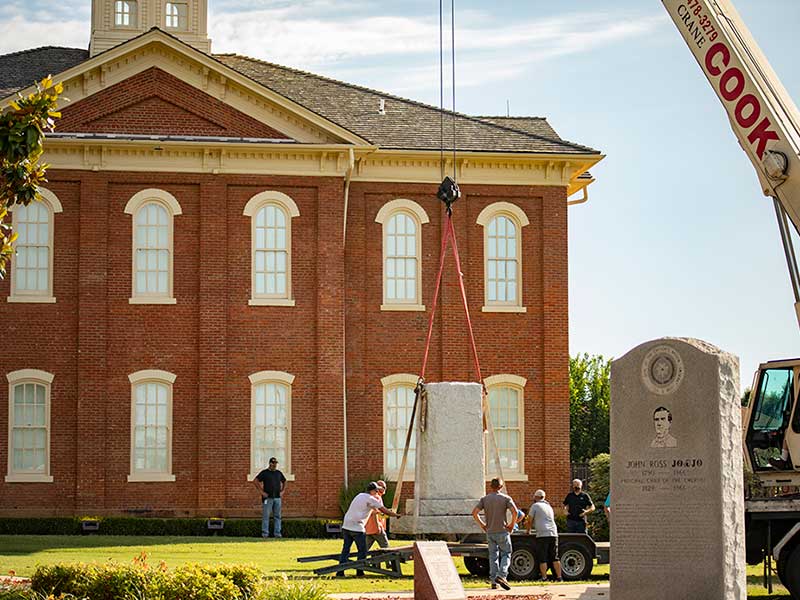How Anti-Blackness Infects Other Minority Groups

On a warm Saturday morning this June, a crane pulled up to the courthouse square in downtown Tahlequah, Oklahoma. As controversial monuments were being taken down by activists and cities across the country, the Cherokee Nation shook two Confederate monuments loose from their foundation, strapped them to a trailer, and put them in storage.
“There are some painful references on these monuments,” Cherokee Nation Principal Chief Chuck Hoskin Jr. said at the courthouse square. “And I think we live in a time when we need to be mindful of the unity we have here on the courthouse Capitol Square.”
One of the monuments, a 13,000-pound slab of granite, was installed in memory of my great-uncle, Stand Watie, who led the Cherokees on the side of the Confederacy. The Cherokee Nation‘s role in the United States Civil War is complex, and Watie was the last Confederate general to surrender. Watie’s monument and a marble fountain memorializing Confederate soldiers were installed by the United Daughters of the Confederacy in 1913 and 1921, at a time when the square was controlled by the state of Oklahoma.
…
By 1850, an estimated half of all Cherokee citizens were of mixed race. Prior to Oklahoma statehood, in 1907, the Cherokee Nation included Cherokee Indians, adopted Delaware, adopted Shawnee, intermarried whites, freedmen and their descendants. With the exception of a few rolls leading up to allotment, the records the nation kept of its citizens did not include blood quantum — or even note who was Cherokee “by blood” and who was not. But the Dawes Roll, which was created so the United States could divide up communally owned tribal land and eventually open it up to white settlers, changed that. Between 1898 and 1914, as the roll was completed, the lines of citizenship hardened.
At first, when land was allotted to tribal citizens, it could not be sold; the nation wanted to protect its landowners from predation. But as white settlers’ demand for land grew, Congress changed the rules. The first people Congress lifted restrictions on were those on the freedmen roll. Congress also lifted restrictions on people who had less than half Indian blood, and it allowed white guardians to control the property of anyone who had over half. The system treated Cherokees differently based on race and blood quantum, but arguably everybody lost.
….
And, at the same time, it is undeniable that those of us who are mixed-white Cherokee citizens have more privilege — not only because the broader American society rewards whiteness, but because we have more power in our tribe. We are the majority, and by a wide margin. And with that power comes a lot of responsibility.
Today, we are at another pivotal moment in Cherokee history. In 2017, after a federal court order, the nation restored the inherent Cherokee citizenship rights of the freedmen descendants. But even though the decision offers an opportunity for healing within our tribe, that’s not guaranteed. As the recent controversy over Confederate monuments makes clear, the court decision doesn’t magically wipe away 200 years of history — or end all of the prejudice and denial that comes with it.
Because of so many factors–historical racism, the legacy of slavery, the white instituted blood quantum to define the tribes which has become more politicized in the age of gaming and the profit splitting that results, colorism and the benefits of whiteness within people of color–racism and privilege are major issues in Native communities. And this works in a variety of ways in other minority communities as well. Think of the differences between light-skinned Mexicans who are often working the tables at restaurants versus the indigenous Oaxacans and Guatemalans relegated behind the kitchen door or tensions between Black and Asian communities in inner cities. Race is complicated and privilege is something constantly shifting. The battle against racism has to be fought amongst nearly all of us. And it is a real battle that requires real action.


